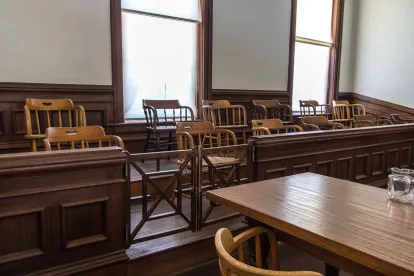Hello and welcome to the IMS Insights Podcast. Today, we’re speaking with IMS Director of Expert Search Services, Erica Evans, about expert witness recruiting, case complexity, and vetting implications. Erica Evans develops winning expert witness search strategies for high-stakes matters across industries, including banking, securities, finance, cybersecurity, pharmaceutical, manufacturing, technology, and healthcare. Under her leadership, the Expert Search team locates subject matter authorities precisely aligned to the needs of Am Law 100 litigators and corporate clients.
Adam Bloomberg:
Okay, thanks for joining us today, Erica, so nice to meet you. So why don’t we start with a little bit about you telling us about your background, you know, maybe, how did you initially become interested in working with expert witnesses and in litigation.
Erica Evans:
Adam, of course, and so nice to meet you as well. I’m excited to speak with you a bit here. Let me just start kind of from the top; my educational background is actually in political science, specifically, with an emphasis in foreign affairs and human rights. And while I was focused on obtaining my master’s degree, I also worked for a local law firm simultaneously, and at that time, I was really concentrating on uncovering where I felt most passionate and where I should focus on progressing my professional career. So, I contemplated several different paths, including, you know, whether, for instance, I wanted to go into academia to teach international relations, or maybe go to law school, you know, to focus on environmental or human rights law, maybe something specializing in issues related to human dignity and equality.
Erica Evans:
And that short time that I worked in a law firm, though, really shaped my initial career. In that, I quickly found I was fascinated by litigation and working alongside lawyers but that becoming one was not my true calling. So as a litigation assistant at the firm, I focused on a specific practice area and gained quick experience with the fast-paced nature and hustle and bustle of the law firm environment. My role involved several facets, but the most interesting to me was tracking down and calling doctors to schedule their deposition and also pouring through past deposition transcripts.
Though the doctors I called weren’t expert witness candidates, I was still able to quickly understand how important their involvement and expertise would be to the case. Because my initial dream of becoming a lawyer started to fade, I quickly looked online to see what else might be out there that would better align with my interest, and that’s when I came across IMS. So, you must imagine my excitement when I saw there was a company that worked alongside attorneys in exactly the capacity I was most interested in, which is providing them with expertise to help win their cases. And so, I was lucky enough to join IMS quickly after discovering them.
I joined as a sales and business administrator, where I supported our sales team, assisted with the scheduling of interviews for expert witness candidates, and really just supported the ongoing communication with my internal team and external clients. Throughout this time, though, I still had my eye on what I really wanted to do, which was to talk and learn from the experts themselves. So, I quickly set my focus on doing just that. I applied and became a research specialist with IMS.
Erica Evans:
I was conducting custom searches to uncover the best talent for our clients. But from there, I finally landed the role I was really after, which was as a recruiter. I then received firsthand experience vetting and qualifying the experts themselves. Fast forward to now, I am lucky enough to oversee the expert witness sourcing and recruitment service line we offer our clients, and I could not be involved in a more fascinating facet of our business.
Adam Bloomberg:
Alright, love to hear that. That’s interesting about your background. There are so many folks coming at it from the same angle where we didn’t necessarily want to go to law school, but we want to be around litigation, around expert witnesses, and around the process of trying cases, so that really falls in line with a lot of other folks in this position. So, let’s start with another softball question. What do you enjoy the most about working with experts?
Erica Evans:
So many things. But you know, I’ve had a unique opportunity to not only recruit experts for our attorney clients but also assist with introducing new potential experts to IMS who we might partner with in the future. And because IMS works across so many cases and within those cases involving so many niche industry types, you begin to know a little about a lot of different fields of expertise. So essentially, I guess you could say you get pretty good at trivia.
Erica Evans:
As a recruiter, it really was fascinating to talk with all these highly intelligent people at the top of their fields. I mean, at 9 a.m., you could be talking to an expert in protein antibody formulations; at 9:30, an expert in voice recognition; at 10 a.m., an expert in… I don’t know medical device design and so on. What I enjoyed most and now enjoy as I lead this very highly skilled team is just the short glimpse we get into these experts’ careers. You know, for me, it’s really mind-boggling how intelligent and knowledgeable they are in their specific craft and area of expertise. And aside from just getting to learn so much from these people, I also have thoroughly enjoyed having a hand and bringing unique consulting opportunities to them.
Erica Evans:
For example, we had an expert referred to us by another who we had the luxury of speaking with at the end of last year. And this person is truly an authority on state and federal law enforcement, and we quickly shared his expertise and interest with our research team—our group of up-sourcers essentially—and they’ve been keeping an eye out for projects that appear to be a match for his skill set. And in just a matter of a couple of months, we’ve been able to present him forward on two separate opportunities, and we’re awaiting the client’s final selection decision. You know, this is what it’s all about. Speaking with the most knowledgeable of people in different fields, but also finding them the right opportunities to work on these fascinating cases.
Adam Bloomberg:
Okay, so you rattled off some different types of cases from intellectual property to commercial to big pharma to financial matters. It has to get kind of deep sometimes and then the weeds. So, how important is it to understand the intricacies of an attorney’s case and the role of the expert witness in that specific case?
Erica Evans:
Oh, incredibly important. Expert witnesses play an important role in cases, of course, and for that reason, it’s extremely important that we understand the intricacies of an attorney’s case and the role of the expert witness, so we can locate and offer the best talent to our clients. For each project, we dedicate a unique search team to source, recruit, and manage our clients’ expectations.
Erica Evans:
So, an accurate and detailed gathering of specifications from our client is critical to the success of the search for their expert witness. Simply put, we must understand the client-specific needs for their expert witness candidates, and that really allows for accurate sourcing by the assigned researcher and appropriate vetting by the assigned recruiter. And we are we’re utilizing this custom search process and employing internal and external resources to find the best talent and to locate experts who fit those specific specifications. So understanding what those are is so critical to our success, but also to the value that we ultimately bring to our clients.
Erica Evans:
Our recruiting team is building relationships and connecting with experts across a variety of industries, and so they’re thoroughly vetting and qualifying candidates by confirming their qualifications, availability, interest, and ensuring they’re conflict-free. Ultimately, you know we’re presenting the most highly credentialed and experienced candidates to our clients. And we simply cannot do that successfully without understanding what the attorney needs their expert witness to do. It’s also, though, equally as important that the recruiter be able to share the case details and anticipated role of the expert with the candidates we vet.
Erica Evans:
During our initial conversation with them, you know it’s very common that experts also want to understand the complexities of the case to ensure they’re confident in their abilities to assist. And that’s not just to ensure that the technical aspects of the case are understood and within their area of comfort, but also to make sure they feel confident that they can support a client’s case if they were to be selected.
Erica Evans:
Let’s take a specific example that I can share with you. For instance, one comes to mind that my great team of researchers and recruiters assisted with. And specifically, here our client requested an expert in figure skating regulations, and it was important for us to understand their primary case issue, which included a former Olympic figure skater’s bid to be released to a new team, which was restricted by their current team which allegedly prevented the young competitor from training for the build-up to the next Olympic Games. Our client very clearly and specifically shared their perfect expert, which included someone knowledgeable about International Skating Union or ISU rules, cases held before the ISU governing body, and general expertise around the shelf life of an Olympic skater but also you know the ramifications of not being on a team or able to train.
Erica Evans:
And our internal team sourced and vetted a sampling of potential experts, which included an independent hockey professional, a former figure skater, and also skating coaches. But ultimately, our client landed on the founder of an international sports governance consultancy, who had more than 15 years of experience, and his former role at the ISU headquarters in Switzerland gave him firsthand knowledge of ISU rules and cases, including several exceptions for release. That case dismissed—the Court dismissed this case without prejudice specifically. But you know our internal team was successful in getting one of our experts retained because we knew exactly the intricacies of the case and what that client specifically needed.
Adam Bloomberg:
Excellent, okay, I’m assuming, well, if I had to guess, you’ve been involved in easily thousands of expert witness searches, is that right?
Erica Evans:
Oh, absolutely.
Adam Bloomberg:
Okay, so can you discuss the significance of thoroughly vetting a potential expert and really the potential implications and risk to the attorney that skeletons may create?
Erica Evans:
Oh, sure, that’s one of my favorite topics. You know that the vetting process is very critical. Even before vetting, though, a key process is conducted where our research team performs a skeleton or due-diligence check prior to even submitting any candidate to a list for a recruiter to reach out to. And skeletons consist of things such as, you know, criminal convictions, maybe controversial past writings, bankruptcy, or anything else that would be an opportunity for opposing counsel to discredit an expert. Our research team utilizes a Nexis Diligence and Google to greatly reduce the chances of putting IMS, our attorneys, or our experts in a bad situation.
Erica Evans:
If you think of our recruiters, on the other hand, they’re reaching out to the listing of candidates identified—really developing relationships with experts. And you know, like I mentioned, they’re responsible for thoroughly vetting and qualifying those candidates by phone. The vetting and qualifying process is really detailed, and for us, it includes connecting with experts, clearing conflicts, providing a case overview, asking open-ended questions… You know, really ensuring the experts’ experience and expertise align with the attorney client’s needs.
Erica Evans:
They discuss past litigation experience, confirm the expert’s availability to meet the time commitment and overall case deliverables. They’re negotiating rates, retainers, and payment terms, but also addressing any potential skeletons or Daubert challenges. The recruiter is really checking beyond what is on paper and assessing presentation style, bias, personality, and history. And oftentimes, personal history can come up under testimony.
So, while vetting or even introducing a new expert to IMS, we asked them if there’s anything at all in their past that counsel should be aware of that may become a problem under testimony. And, we ask this because, you know, we don’t want to put anyone in an awkward situation on the stand. And if counsel is made aware ahead of time, they can assist in handling any potential roadblock that may cause their testimony to be excluded. You know so skeletons can come in many different shapes and sizes and can truly be detrimental to one of our client’s cases.
Erica Evans:
So, we always ask them if there’s anything in their past that you know just generally might be an embarrassment if discovered or disclosed on the witness stand. You know, as I mentioned, skeletons can range from drug charges to DUIs, to having had previous testimony thrown out due to maybe improper methodology. In some cases, being an expert witness is a challenging task, and an expert’s testimony can really make or break the case.





 />i
/>i

